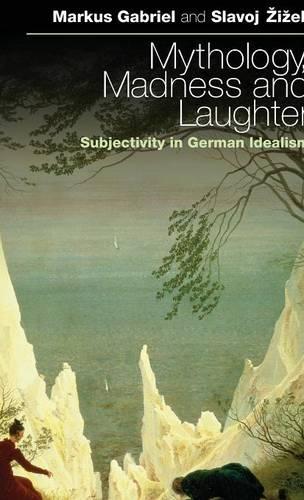
Mythology, Madness, and Laughter: Subjectivity in German Idealism
(Hardback)
Publishing Details
Mythology, Madness, and Laughter: Subjectivity in German Idealism
By (Author) Dr Markus Gabriel
By (author) Slavoj iek
Continuum Publishing Corporation
Continuum Publishing Corporation
2nd October 2009
United States
Classifications
Tertiary Education
Non Fiction
141.0943
Physical Properties
Hardback
208
Width 144mm, Height 222mm, Spine 20mm
Description
Mythology, Madness and Laughter: Subjectivity in German Idealism explores some long neglected but crucial themes in German idealism. Markus Gabriel, one of the most exciting young voices in contemporary philosophy, and Slavoj iek, the celebrated contemporary philosopher and cultural critic, show how these themes impact on the problematic relations between being and appearance, reflection and the absolute, insight and ideology, contingency and necessity, subjectivity, truth, habit and freedom. Engaging with three central figures of the German idealist movement, Hegel, Schelling, and Fichte, Gabriel, and iek, who here shows himself to be one of the most erudite and important scholars of German idealism, ask how is it possible for Being to appear in reflection without falling back into traditional metaphysics. By applying idealistic theories of reflection and concrete subjectivity, including the problem of madness and everydayness in Hegel, this hugely important book aims to reinvigorate a philosophy of finitude and contingency, topics at the forefront of contemporary European philosophy. MARKUS GABRIEL is Assistant Professor of Philosophy at the New School for Social Research, NY. He has published a number of books and journal articles in German, including Der Mensch im Mythos (De Gruyter, 2006), and Das Absolute und die Welt in Schellings Freiheitsschrift (Bonn University Press, 2006).
Reviews
"German post-Kantian idealism was designed to effectuate a shift from epistemology to a new ontology, but without simply regressing to pre-critical metaphysics, contend Gabriel and Zizek. They locate the gap between the alleged absolute thing-in-itself and the relative phenomenal world within the absolute itself. It is a crucial duty of contemporary post-Kantian idealism, to make sense of this shift, they say, in order to contribute to the overcoming of epistemology as prima philosophia. Hegel and Fichte are the idealist figures they concentrate most on." -Eithne O'Leyne, BOOK NEWS, Inc.
"Zizek (Univ. of Ljublijana, Slovenia) offers two short essays, on Hegel and Fichte, which provide the same brisk thought-provoking blend of Lacanian psychoanalysis, German idealism, and popular culture familiar to readers of his other works." -Choice
'Sheer intellectual exuberance' - Journal of European Studies
Reviewed in The European Legacy, Vol. 16, No. 4
Author Bio
Markus Gabriel is Chair in Epistemology and Modern and Contemporary Philosophy at the University of Bonn, Germany. He has published a number of books and journal articles in German, including Der Mensch im Mythos (De Gruyter, 2006), Das Absolute und die Welt in Schellings Freiheitsschrift (Bonn University Press, 2006) and Skeptizismus und Idealismus in der Antike (Suhrkamp, 2009) and is also co-author, with Slavoj Zizek, of Mythology, Madness and Laughter (Continuum, 2009) Slavoj iek is a Hegelian philosopher, a Lacanian psychoanalyst, and a Communist. He is International Director at the Birkbeck Institute for Humanities, University of London, UK, Visiting Professor at the New York University, USA, and Senior Researcher at the Department of Philosophy, University of Ljubljana, Slovenia.
